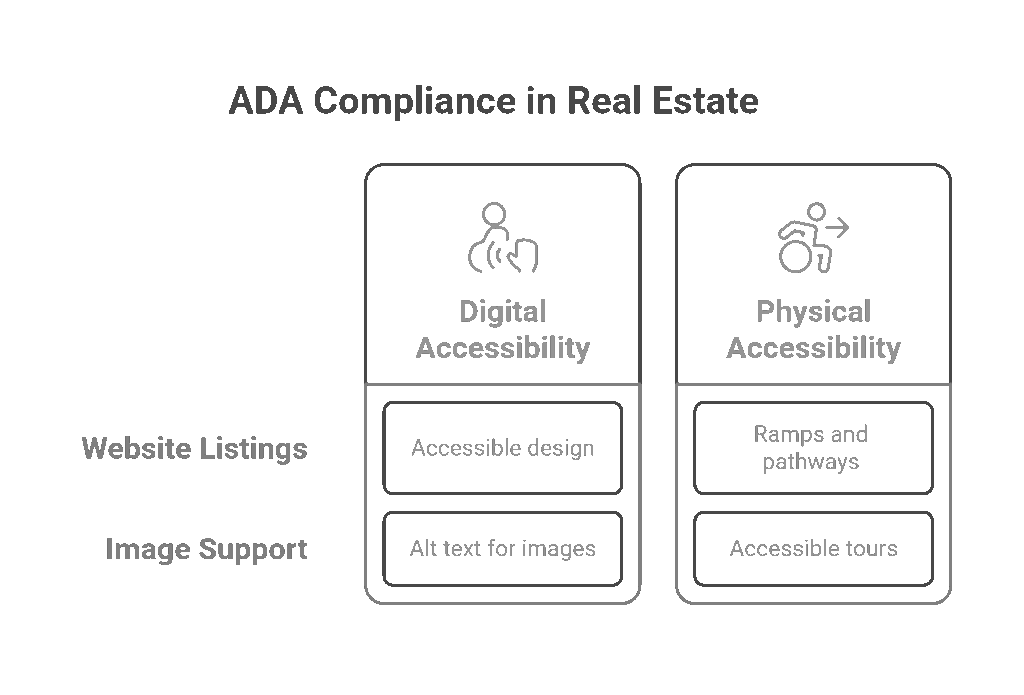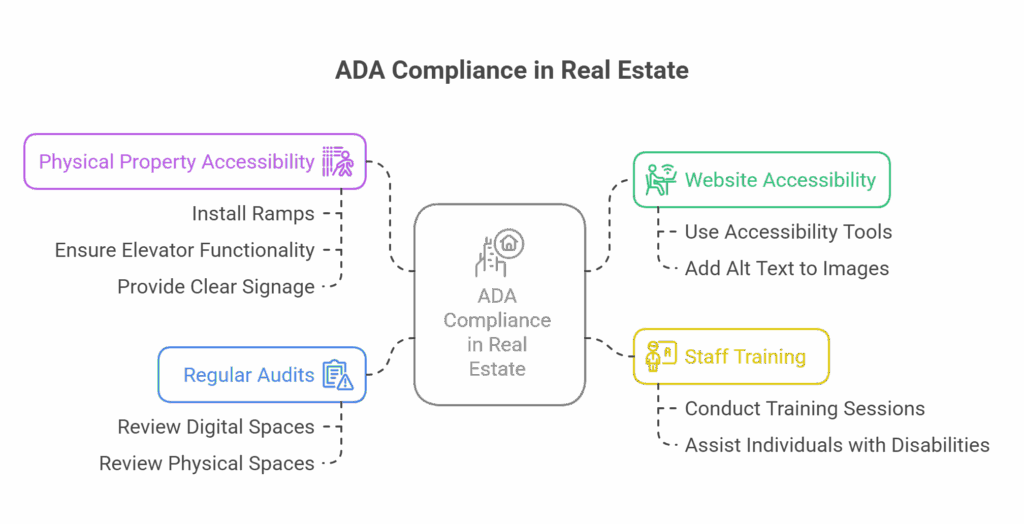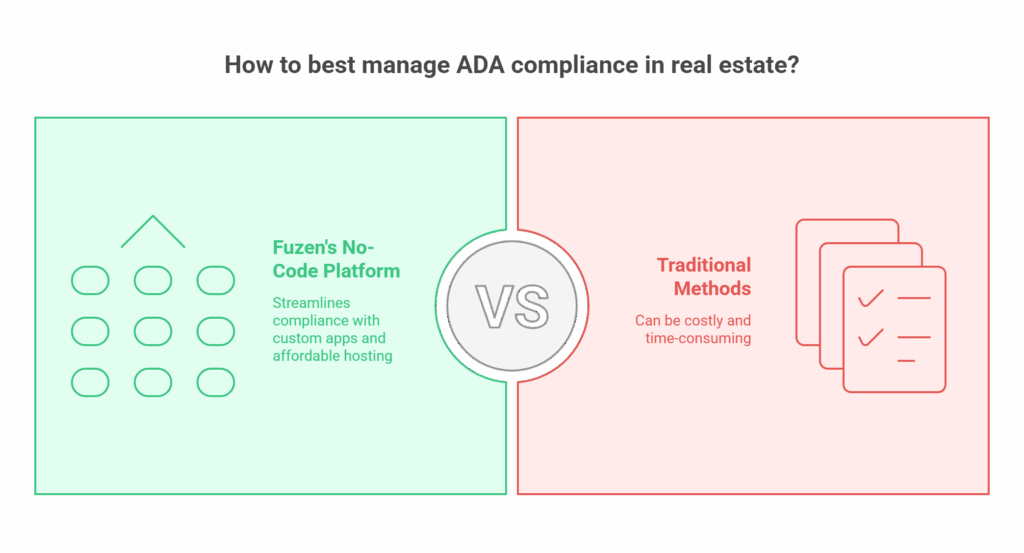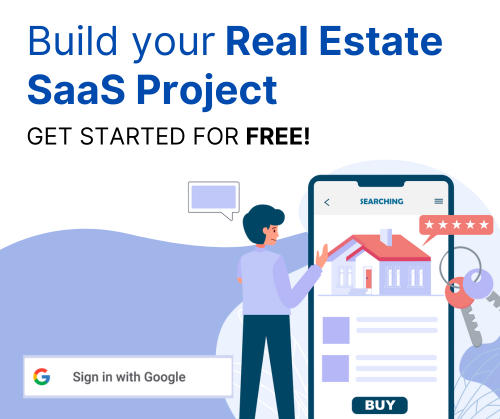ADA compliance in real estate is crucial in the industry, ensuring that property listings and showings are accessible to everyone, including individuals with disabilities. This involves making both digital platforms and physical properties easy to access and navigate.
Real estate professionals are increasingly aware of their legal responsibilities under the ADA (Americans with Disabilities Act). They understand the importance of adhering to these standards. It's not just about compliance; it's about creating an inclusive environment for all potential buyers and renters.
By prioritizing accessibility through ADA compliance real estate best practices, agents can broaden their market reach and ensure that every individual, regardless of ability, can confidently explore and consider properties. This commitment not only builds trust but also strengthens the business’s reputation. Explore how CRM tools are shaping the real estate industry to support such inclusive and compliant practices.
Understanding ADA Compliance in Real Estate

ADA compliance real estate means ensuring that both digital platforms and physical spaces are accessible to individuals with disabilities. Let’s break it down into two key areas: digital accessibility and physical accessibility.
Digital Accessibility
- Accessible Website Listings: Websites should be designed so that everyone can navigate and use them easily. For examples of CRM platforms already optimized for property professionals, see Top CRM in Real Estate Industry, which highlights accessible workflows built for agents. This includes readable fonts, keyboard-accessible navigation, and ensuring that anyone can interact with the website without barriers.
- Alt Text for Images: Every image on a property listing should have alt text. Alt text is a short description of what the image shows, and it helps visually impaired individuals understand the content through screen readers.
Physical Accessibility
- Ramps and Clear Pathways: Properties should have ramps for wheelchair access and clear pathways for easy navigation. This ensures individuals with mobility impairments can visit and tour properties without hindrance.
- Accessible Property Tours: Properties should be set up so that individuals with disabilities can tour them comfortably. This might involve ensuring elevator access, proper signage, and arranging space for easy movement.
By following ADA compliance real estate guidelines, real estate professionals create a more inclusive environment. This approach not only fosters inclusivity but also expands market reach by accommodating people of all abilities, enabling more individuals to explore and consider properties.
Importance of ADA Compliance in Property Listings
When discussing ADA compliance in real estate, ensuring physical accessibility during property tours is just as critical as providing digital accessibility. Real estate professionals must create a seamless and welcoming experience for individuals with disabilities when they arrive for showings.
Organizing Accessible Showings
- Plan tours keeping in mind the accessibility needs of individuals with disabilities. This involves strategic planning to accommodate various needs, such as mobility issues or sensory impairments.
Maintaining Clear Pathways
- Ensure all pathways in and around the property are clear and wide enough for wheelchair access.
- Remove obstructions that could impede the movement of individuals with mobility aids.
Wheelchair Ramps and Elevator Access
- Install ramps where steps exist to provide wheelchair access. These should be sturdy and correctly positioned to ensure safety and ease of use.
- Ensure that elevators are available and operational for accessible tours of multi-story properties.
Appropriate Signage
- Use clear and visible signage to guide individuals throughout the property. This includes signs for accessible entry points, elevators, and restrooms.
- Consider braille signage for visually impaired individuals to navigate the property effectively.
Fostering an inclusive environment goes a long way in improving community relations. It shows commitment to serving all individuals equitably, enhancing the firm's reputation. Clients appreciate businesses that prioritize inclusivity, which can lead to increased business opportunities and a positive brand image.
Actionable Tips for Real Estate Agents

ADA compliance is a vital aspect of modern real estate practices. Here’s a simple checklist for real estate agents to ensure both digital and physical accessibility:
- Verify Website Accessibility: Regularly assess your website for accessibility. You can compare features and see how an accessible system works in practice by reviewing Best CRM for Property Listings Management. Use tools that highlight areas of improvement, ensuring anyone can easily navigate your site.
- Include Alt Text for Every Property Image: Add descriptive alt text to images on your property listings. This allows individuals using screen readers to understand what each image portrays.
- Ensure Physical Properties are Accessible:
- Install ramps and ensure clear, wide pathways inside and outside the property for easy movement.
- Ensure elevators are in working condition and easy to access during tours.
- Provide appropriate, clear signage, including braille signs where possible.
- Train Staff on ADA Protocols: Conduct regular training sessions for your team on ADA requirements. This ensures everyone knows how to assist individuals with disabilities effectively during property visits.
- Conduct Regular Audits: Conduct regular audits of both your digital and physical spaces to maintain high standards. Notice how easy it is to schedule accessible tours when you use a modern tool such as Best Real Estate Scheduling Software for Easy Booking. Properties should be set up so that individuals with disabilities can tour them comfortably.
By following these actionable tips, real estate agents make the property search experience more inclusive. Accessible services engage wider audiences, build trust, and can lead to increased client satisfaction and business growth.
Leveraging No-Code Solutions for ADA Compliance

Incorporating no-code solutions can significantly streamline ADA compliance for real estate professionals. Fuzen’s CRM platform offers a powerful toolset to help with this process. A concrete example of building a sector-specific tool appears in Real Estate Marketplace Services App With No Code. Let’s see how it works:
Streamlining ADA Compliance with Fuzen
- Track ADA-Compliant Listings: Fuzen's no-code dashboard allows real estate agents to easily manage and review listings to ensure they meet ADA standards. You can organize information efficiently, making it easy to identify and update non-compliant listings.
- Schedule Accessible Showings: Simplify the scheduling of property tours with ADA considerations in mind. Fuzen facilitates the organization of accessible showings, ensuring properties are prepared for all potential visitors.
- Centralize Accessibility Documentation: Keep all ADA-related documentation in a single, accessible location. Fuzen makes it easy to store and retrieve necessary documents, helping maintain organized records for future reference.
Benefits of Fuzen’s No-Code Solutions
- Affordable Hosting: Fuzen provides cost-effective hosting solutions. You only pay for hosting, keeping costs down while maintaining high-quality service.
- Create Your Own ADA-Compliant Apps: With Fuzen's no-code platform, agents can build custom apps tailored to ADA compliance needs. This empowers agents to adapt quickly, ensuring they can meet specific client requirements efficiently.
Fuzen's robust and flexible platform makes ADA compliance more manageable and less daunting for real estate professionals. By leveraging these tools, agents can focus on serving their clients better while adhering to important accessibility standards.
Conclusion
Incorporating ADA compliance in real estate is crucial. It plays a vital role in promoting inclusivity and ensuring that all individuals can access property listings and showings. By adopting these practices, real estate professionals not only adhere to legal standards but also open the doors to a wider audience. This inclusivity can lead to more significant business opportunities, enhancing both reputation and reach.
To streamline this process, agents can leverage no-code platforms like Fuzen. For inspiration on next-gen property-focused software, browse our 15 Best Real Estate SaaS Ideas—many of these concepts can also embed accessibility from day one. These tools make it simple and cost-effective to stay on top of compliance requirements.
With built-in features for tracking, scheduling, and documentation, Fuzen empowers agents to focus on delivering exceptional service while maintaining full ADA compliance real estate standards — all through a customizable real estate CRM template.

Pushkar is a seasoned SaaS entrepreneur. A graduate from IIT Bombay, Pushkar has been building and scaling SaaS / micro SaaS ventures since early 2010s. When he witnesses the struggle of non technical micro SaaS entrepreneurs first hand, he decided to build Fuzen as a nocode solution to help these micro SaaS builders.


